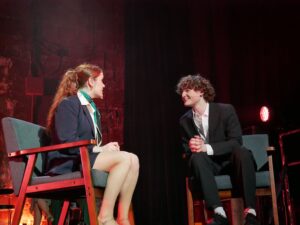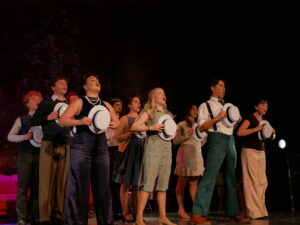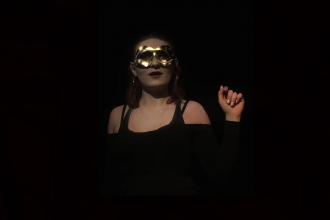Stephen Sondheim’s Company first premiered in 1970 and has been captivating audiences across the world ever since, and Director Anna Brosowsky’s rendition of Company is no exception.
Company was notably one of the first concept musicals, which focus on character studies and thematic resonance over narrative continuity. This new form was a groundbreaking shift in musical theatre history. Unlike traditional musicals driven by a linear plot, Company revolves around a central theme: the protagonist Bobby’s exploration of relationships and his fear of commitment through a series of loosely connected vignettes. Company showcases Bobby’s married friends as caricatures of the different forms marriage can take, pressuring him while simultaneously expanding his understanding of the value, intricacies, and pains of life partnership. We also see Bobby interact with three ex-girlfriends, theoretically potential marriage prospects, but with whom he doesn’t feasibly see a future.
Anyone familiar with Sondheim’s work might have initially been skeptical of this selection for an undergraduate theatre group. One of my first thoughts after hearing about this production was: how would the emotional depth and life experiences of these characters come across when played by actors half their age? This concern was also shared by Milan Miville-Dechene, president and production manager of AUTS and producer for Company. “Initially, the directors didn’t want to do Company because the characters are 35-year-olds,” he explained. Tackling Company’s sophisticated and mature themes is challenging for a university production led by students in their late teens and early twenties, but after seeing the show, I can confidently say there wasn’t a single performer on stage who didn’t fully embody their character’s emotional depth. This was, without a doubt, the most impressive achievement of this young group of performers.
A close second to this impressive feat would be the cast and crew’s technical abilities. The vocals were outstanding throughout the production. Actress Irene Newman Jimenez, who played Joanne, credited the musical director and team: “Katie and Jeremy, the vocal and music directors, were really good about teaching us the rhythms. What makes Sondheim musicals so difficult to sing is not only the range but the rhythmic changes.”
These powerful vocals were supported by a live band consisting of keyboard, percussion, bass, trumpet, and woodwinds. Staging a production with a live band is an entirely different challenge for young directors, but it was executed seamlessly. Introducing another moving part into an already complex production was a bold choice, but it certainly paid off. The live instrumentation brought the show to life, adding depth and energy to the performance.
While all the actors seemed well suited to their roles, Odessa Rontogiannis and Christopher Boensel as Sarah and Harry were clear standouts. Their scenes were both comedic and touching, and despite bringing high energy to their performances, they never veered into exaggeration, maintaining an authentic dynamic. Beneath their sharp comedic timing, they subtly conveyed the profound incongruities that troubled their characters’ attempts to find joy together.
Another highlight was the beautifully delivered solos by Frank Willer as Bobby, “Someone Is Waiting,” “Marry Me a Little,” and “Being Alive.” These songs mark Bobby’s character development throughout the show and are some of the most iconic pieces in the male musical theatre repertoire. While occasionally Willer seemed to fall into the routine of overly rehearsed movements and choices, in these moments he truly shone as an actor and vocalist. To find something to critique, I’d have to get very nitpicky. Some choreography lacked polish, but it hardly detracted from the overall quality of the production and if that’s the worst I can come up with, it’s safe to say this was an outstanding production overall.
Productions like this are the heartbeat of McGill’s musical theatre community, keeping it alive and thriving. After speaking with a few of the 50+ students involved in this production, it’s clear just how vital these opportunities are. Many of the actors and production team members aren’t studying anything related to acting or singing, yet they’re able to fully embrace their artistic passions. Actress Ava Burgess, who played Susan, shared, “It’s such a good expressive outlet. I love that I have an extra part of my experience at McGill where I get to do the performing arts.” While McGill boasts strong academic programs across disciplines, musical theatre isn’t among them, making robust extracurriculars essential. Zain Rahim, who played Peter, reflected, “Musicals are a medium that transmits emotion in such a powerful, palpable way.” Anything spoken about with such passion deserves to be valued. Milan Miville-Dechene summed it up perfectly: “It’s a good opportunity for students who wanted to go into musical theatre but decided to choose McGill for other reasons. This is the thing that keeps them tied to it.” Providing students with spaces to engage in these experiences isn’t just important – it’s essential.
AUTS took a risk in selecting Company, a show that demands sharp wit, emotional nuance, and mature storytelling. However, their production proved that great theatre isn’t limited by age or experience. Through strong performances, excellent vocals, and a live band that elevated the entire show, they brought Sondheim’s work to life with remarkable depth and flair. The production was enthrallingly beautiful, complex in its humor, and brilliantly subtle, capturing both the charm and the existential undercurrents that make Company timeless. As put by Irene Newman Jimenez, “The show is ultimately about human connection, and what it means to have another person in your life who so intimately understands you and knows you.” This sentiment resonated throughout the performance, making it not just an ambitious undertaking, but one that absolutely paid off.
All photos by Natasha Ellis.










